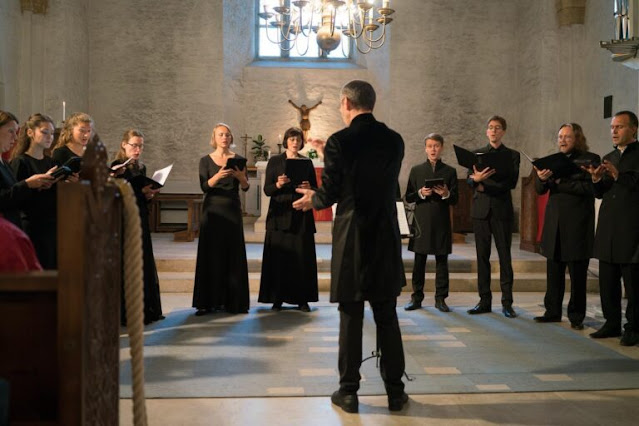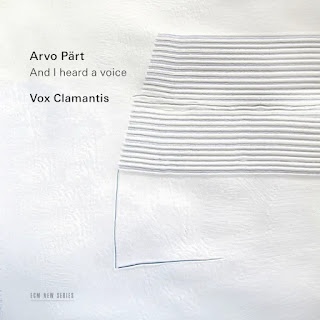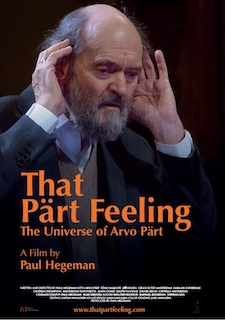
Vox Clamantis and conductor Jaan-Eik Tulve performing in Haapsalu Cathedral
Review by Robert Hugill
 And I hear a voice
And I hear a voice
Vox Clamantis, Jann-Elk Tulve (conductor)
ECM Records
Jaan-Eik Tulve and his ensemble bring their experience with both Arvo Pärt’s music, that of other contemporary composers, as well as Gregorian chant and early polyphony to create a musical journey of profound beauty and great musicality.
Vox Clamantis, with artistic director and conductor Jaan-Eik Tulve, is an Estonian vocal ensemble specializing in performing Gregorian chant and early polyphony alongside contemporary music. Though they have a strong association with the music of Arvo Pärt, in the eight years since I first heard them in Tallinn (at the 2017 Estonian Music Days, see my review), I have experienced their performances of a wide range of music.
Their latest disc, And I heard a voice on the ECM label, was issued in time to be a 90th birthday present for the composer. The music on the disc, spanning over 30 years of Pärt’s composing life, features Nunc dimittis, O Holy Father Nicholas, Sieben Magnificat-Antiphonen, Für Jan van Eyck, Kleine Litanei and And I heard a voice. The fifteen singers of Vox Clamantis are conducted by Jaan-Eik Tulve and they are joined by organist Ene Salumae on Fur Jan van Eyck.
The recording was made in 2021/22 in Haapsalu Cathedral in the very west of Estonia. Haapsalu Cathedral, which is first mentioned in 1279, is one of the largest single-nave churches in the Nordic and Baltic countries. The recording was produced by Manfred Eicher and from the first notes of Nunc Dimittis it has a very particular sound quality. Eicher has surrounded the ensemble by what might almost be termed an aura. Nunc Dimittis is sung with a gentleness and clarity which belies the sheer accuracy and focus of the performance.

And I Heard a Voice, the title track of an album of Arvo Pärt’s new works performed by Vox Clamantis, is, to date, the only work of Pärt’s set to sacred text in his mother tongue, with words based on a passage from the 1938 Estonian translation of the Book of Revelation, where the phrase ‘they rest from their labours’ is expressed as ‘they breathe from their labours [nad hingavad oma vaevadest].’ As the booklet essay notes, ‘the incessant repetition of these words becomes the most important image of the work, the symbol of eternal life.’
The acoustic is not being used to hide behind nor as an all-purpose device. As might be expected from this ensemble the performances have a beauty and a considered naturalness which makes Pärt’s music profoundly appealing. They do not bring the sort of edge or welly to the music that the larger forces of the Estonian Philharmonic Chamber Choir does. Instead, we have a tender delicacy allied to pinpoint accuracy and an ability to hammer home where necessary.
Dating from 2001, Nunc Dimittis is one of the earliest works on the disc whilst O Holy Father Nicholas is one of the most recent. Written in 2021 for the opening of St Nicholas Church at Ground Zero of the World Trade Center in New York, it draws from the Orthodox hymn for the feast of St Nicholas. The writing here is less aethereal than the earlier, more consciously tonal work. There is a brightness to the use of the upper voice, along with a tenderness in the way the singers approach Pärt’s repetitions. It is, by Pärt’s standards, a long choral work lasting over ten minutes. As performed here, there is a focused, meditative quality to the result.

Nunc Dimittis, Vox Clamantis, conducted by Jaan-Eik Tulve, from the album Arvo Part: And I heard a voice. ‘Nunc Dimittis is sung with a gentleness and clarity which belies the sheer accuracy and focus of the performance,’ says reviewer Paul Hugill.
Sieben Magnificat-Antiphonen is the oldest work on the disc, written in 1988, and also perhaps one of the best known. Here the ensemble brings a pin sharp focus to the changing textures whilst not emphasizing the way different blocks butt up to each other as happens in some performances. As a choral singer familiar with performing this work, I cannot help but be impressed with the way the singers (notably the sopranos) touch in Pärt’s lines and make the gaps in them seem natural without any excessive pointing.
 For anyone worried about the soft focus engendered by the acoustic aura, just listen to the dissonances in O Spross aus Isais Wurzel and the way the singers combine accuracy with piercing intensity. And this continues in O Schlüssel Davids where the big chords have a fierceness which does not at all imbalance the whole piece. O Morgenstern with his shifting major/minor harmonies has a lovely gentle glow underpinned by a fine bass line. The complex polyrhythms of O König aller Völker have an understated quality which Tulve brings together in a natural way, to be followed by the final antiphon, its hushed intimacy intercut with piercing intensity.
For anyone worried about the soft focus engendered by the acoustic aura, just listen to the dissonances in O Spross aus Isais Wurzel and the way the singers combine accuracy with piercing intensity. And this continues in O Schlüssel Davids where the big chords have a fierceness which does not at all imbalance the whole piece. O Morgenstern with his shifting major/minor harmonies has a lovely gentle glow underpinned by a fine bass line. The complex polyrhythms of O König aller Völker have an understated quality which Tulve brings together in a natural way, to be followed by the final antiphon, its hushed intimacy intercut with piercing intensity.
Für Jan van Eyck, with organ accompaniment, has a gentle sense of adoration and meditation to it. The intimate yet rather dense organ part complemented by the aethereal occasional contributions of the upper voices. Kleine Litanei from 2015 sets a text devoted to St Virgil. The sound here is warmly choral, with a hushed intensity warmed by the acoustic, alternating with more familiar Pärt style textures, all rendered with a sense of ease and naturalness.

Kleine Litanei, Vox Clamantis, conducted by Jaan-Eik Tulve, from the album Arvo Part: And I heard a voice

O Holy Father Nicholas, Vox Clamantis, conducted by Jaan-Eik Tulve, from the album Arvo Part: And I heard a voice. Written in 2021 for the opening of St Nicholas Church at Ground Zero of the World Trade Center in New York, it draws from the Orthodox hymn for the feast of St Nicholas.
We end with And I heard a voice… Written in 2017, it is Pärt’s only work to set a sacred text in Estonian. The music and the recording return us to the profound, contemplative and meditative aethereal beauties of the opening piece, albeit with a little more grit this time.
This disc is one of profound beauty and great musicality. It takes a very particular view of Arvo Pärt’s music, yet it is performed by an ensemble closely associated with the composer.
 Reviews published here by permission of Robert Hugill–a singer, composer, journalist, lover of opera and all things Handel–at Planet Hugill. To contact Robert and/or to receive his lively “This Month on Planet Hugill” e-newsletter, sign up on his Link Tree. Robert Hugill photo by Robert Piwko. Mr.Hugill’s review of The Last Tree by Alastiar Penam was published at Planet Hugill on 16 September 2025.
Reviews published here by permission of Robert Hugill–a singer, composer, journalist, lover of opera and all things Handel–at Planet Hugill. To contact Robert and/or to receive his lively “This Month on Planet Hugill” e-newsletter, sign up on his Link Tree. Robert Hugill photo by Robert Piwko. Mr.Hugill’s review of The Last Tree by Alastiar Penam was published at Planet Hugill on 16 September 2025.



